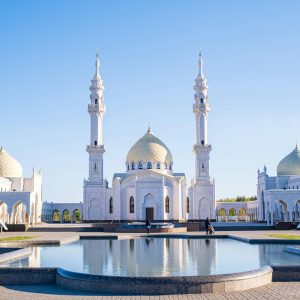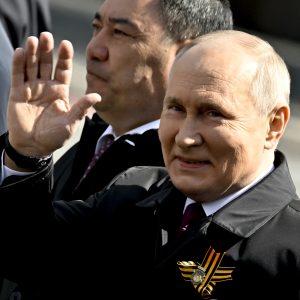Modi’s US visit overshadowed by Sikh concerns and controversy surrounding NSA Ajit Doval
Modi’s focus on global reforms and technological cooperation may be positive narrative for his U.S. trip, but issues related transnational repression will continue to be contentious in the dialogue between Washington and New Delhi
Muslim Network Desk
NEW YORK (MNTV) – Indian Prime Minister Narendra Modi’s visit to the U.S. aimed at strengthening diplomatic ties and boosting technological collaboration, has been overshadowed by growing concerns within the Sikh community and legal controversies involving Indian National Security Advisor (NSA) Ajit Doval.
While Modi’s address at the UN General Assembly focused on urgent global reforms and the role of collective strength in combating emerging threats, a parallel narrative unfolded involving allegations of transnational repression and assassination plots targeting Sikh activists abroad.
Addressing the “Summit of the Future” at the United Nations headquarters, Modi underscored the necessity of reforming global institutions to maintain their relevance in contemporary times. His speech highlighted the importance of collective global action to address issues such as terrorism, cyber threats, and conflicts in outer space.
“Reform is the key to relevance,” Modi stated, emphasizing that global actions must align with global ambitions to ensure peace and development.
Indian Prime Minister’s message resonated with the adoption of the UN’s “Pact for the Future,” a blueprint to tackle 21st-century challenges including climate change, conflict, and human rights.
However, Russia’s criticism of the pact indicated a fractured consensus within the international community.
Dmitry Polyansky, Russia’s First Deputy Permanent Representative to the United Nations, voiced dissatisfaction on social media, claiming that the pact was forced through without adequate negotiation.
During his visit, Modi also engaged with the Indian diaspora, hailing them as “Rashtradoots” or “brand ambassadors” of India.
At a packed event in New York’s Nassau Veterans Memorial Coliseum, Modi praised the contributions of the Indian-American community to the U.S. and their role in bolstering India’s global image.
This outreach, coming ahead of the U.S. presidential elections, subtly acknowledged the significant political influence wielded by the 4.5 million-strong Indian diaspora.
In addition, Modi held a roundtable discussion with top U.S. technology CEOs, including Sundar Pichai of Google and Shantanu Narayen of Adobe.
The meeting aimed to enhance cooperation between India and the U.S. in emerging technologies such as artificial intelligence, quantum computing, and semiconductors. This focus on technological collaboration is part of a broader strategy to position India as a global technology hub, leveraging its burgeoning digital economy and tech-savvy workforce.
Sikh concerns
Despite these diplomatic and economic efforts, Modi’s visit was marred by concerns over the treatment of Sikh activists abroad.
A high-profile meeting between senior U.S. officials and Sikh advocacy groups highlighted allegations of transnational repression by Indian intelligence agencies.
The meeting, held just days before Modi’s arrival, discussed threats facing the Sikh community in the U.S., including a foiled assassination plot against Gurpatwant Singh Pannun, a prominent Sikh activist and legal advisor for the Khalistani advocacy group Sikhs for Justice (SFJ).
Pannun, who holds dual U.S.-Canadian citizenship, has accused Indian officials, including NSA Ajit Doval, of conspiring to assassinate him in New York.
In response, he filed a civil lawsuit against the Indian government and specific individuals, alleging a conspiracy to suppress dissident voices through intimidation and violence. The case has escalated diplomatic tensions, particularly given that the U.S. continues to investigate India’s alleged involvement in such plots.
Adding to the intrigue was Doval’s conspicuous absence from Modi’s delegation during his meeting with U.S. President Joe Biden in Delaware. The omission fuelled speculation that Doval may have been detained or otherwise restricted from entering the U.S., although Indian government sources later attributed his absence to domestic responsibilities related to upcoming elections in Jammu and Kashmir.
Doval’s counterpart, U.S. National Security Advisor Jake Sullivan, was present at the Delaware meeting, which also included Secretary of State Antony Blinken and the U.S. Ambassador to India, Eric Garcetti.
The absence of one of India’s most influential security officials from such a high-profile diplomatic engagement raised eyebrows and led to widespread media speculation regarding the reasons behind his non-attendance.
The controversy surrounding Doval and the grievances of the Sikh community have cast a shadow over the otherwise cordial relations between the U.S. and India. While the Biden administration has reiterated its commitment to safeguarding the rights and security of all U.S. citizens, including Sikh activists, it has also emphasized the strategic importance of maintaining a strong partnership with India, particularly in the context of countering Chinese and Russian influence in the Indo-Pacific region.
This delicate balancing act was evident in the statements made by U.S. officials during their meeting with Sikh representatives.
While acknowledging the threats faced by the community and the ongoing investigation into the Pannun case, they also underscored the need for a robust bilateral relationship with India.
For Modi, the visit was an exercise in diplomatic balancing. On one hand, he sought to project India as a responsible global player committed to peace and development.
His call for reforms at the UN was a reiteration of India’s longstanding demand for a more equitable global order, one that reflects the realities of a multipolar world.
On the other hand, the allegations of transnational repression and the lawsuit against Doval have put the Indian government on the defensive. New Delhi has categorically denied any involvement in the plots against Sikh activists and dismissed Pannun’s lawsuit as “unwarranted and unsubstantiated.”
However, the case has brought renewed scrutiny to India’s domestic policies and its treatment of dissident voices, both at home and abroad.
As Modi returns to India, the fallout from his U.S. visit will likely continue to reverberate. The lawsuit against Doval and the heightened awareness of Sikh concerns in the U.S. have added a new dimension to the bilateral relationship, one that could complicate future diplomatic engagements.
For the Indian diaspora, the visit has been a reminder of their dual identity and the complex interplay of politics, community, and international relations.
For now, Modi’s emphasis on global reforms and technological cooperation has provided a positive narrative to his U.S. trip. However, the unresolved issues surrounding Sikh activism and allegations of transnational repression will remain a contentious topic in the ongoing dialogue between Washington and New Delhi.
####










